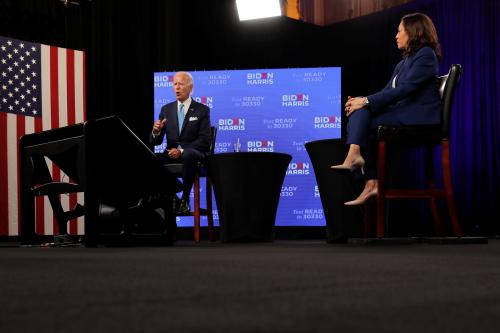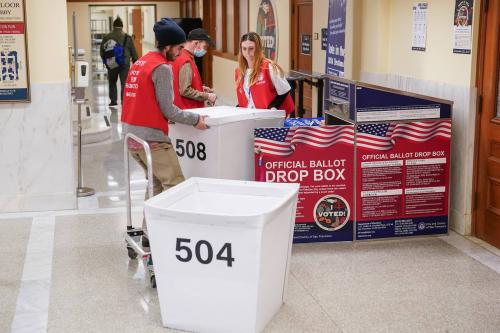The rhetoric of the GOP convention, along with limited information on the Trump-Pence platform, make it difficult to forecast the specifics of technology policy under a second term for Donald J. Trump and Mike Pence. Nonetheless, it is possible to discern some high-level tendencies based on first term actions, public speeches, and policy statements. Generally, one can anticipate more deregulation, selective antitrust enforcement, lowered taxes, increased efforts to lead in global artificial intelligence (AI) leadership, round two of an infrastructure bill supporting 5G networks, little to no effort to confront online hate, tolerance of foreign interference in U.S. democracy, limited labor protections for gig workers, and stronger consequences for China as part of the protectionist trade policies of the current administration. For comparison with our thoughts on a possible Biden-Harris administration agenda, see our companion piece “What to Expect from Biden-Harris on Technology Policy, Platform Regulation, and China.”
More deregulation and retaliation against tech firm critics
The hallmark of the first Trump-Pence term was tech deregulation, mixed with “light-touch” approaches in a few areas. In keeping with GOP orthodoxy, few congressional bills designed to address privacy, competition policy, or cybersecurity came out of this current administration. Instead, the preferred vehicles were presidential executive orders and agency reversals of previous tech policies, starting with net neutrality. Within the first month of Trump’s term, the Federal Communications Commission (FCC) rolled back net neutrality rules adopted during the Obama administration to preserve an open internet and lightened regulatory restrictions on major telecommunications firms. Other similar reversals followed, including the repeal of the Obama-era U.S. broadband privacy rules and the revocation of newly minted broadband subsidies as part of the federal Lifeline program.
The most recent exception to the administration’s stance on prior regulations is its own executive order challenging the integrity of social media platforms. Convinced that tech companies are biased against conservatives, Trump’s recent executive order would “limit legal protections for social media platforms if they don’t adhere to standards of neutrality.” While the order is unclear on how “neutrality” would be defined or enforced, firms, such as Twitter and Facebook, that label Trump statements as false, misleading, or in violation of company guidelines are the current administration’s targets. Support for Trump’s critiques of big tech firms were heard throughout the convention, starting with the kick off speech of conservative activist, Charlie Kirk, who referred to the “self-righteous censor in Silicon Valley.”
In a second term, Trump and Pence would most likely promote further deregulation of telecom and tech industries, with occasional spears thrown at specific adversaries that attempt to limit conservative expression or company executives with whom the president has professional and personal differences. These firms should expect harsh responses and possible retaliation during a second term, like the review and modification of Section 230, which indemnifies big tech firms from intermediate or third-party content. But any passage of meaningful federal legislation will be difficult, given the policy gaps with leading Democrats. In the absence of a coherent baseline for federal tech regulation, a second term will see several states and local governments create and adopt their own rules as already evidenced in newly adopted privacy practices and bans on certain technologies like facial recognition.
Selective antitrust enforcement
The last few years have seen political meddling in antitrust enforcement, as noted in a recent Washington Post column by our colleague Bill Baer. More acquisitions and mergers will likely be approved during a second Trump-Pence term with special treatment for friends of the administration and reprisals for the administration’s critics. The latter should expect detailed oversight of their acquisitions and regulatory reviews of their business practices. Federal agencies will also likely be stacked with presidential cronies and afflicted by rapid turnover, enabling selective enforcement largely along partisan lines.
Low taxes (unless Republicans pivot towards deficit reduction)
Taxes likely would remain low for tech companies because there would be little Republican movement toward tax increases or establishing new fees on financial firms or technology companies. This is in keeping with the party’s long-term view that the best circumstances to create jobs and spur innovation are low taxes and deregulation. A business-friendly environment would most likely persist during a second Trump term, fueling continued rises in the stock market.
The only risk in this area would be if Republicans pivot towards deficit reduction and seek to curtail government spending or address the rapidly rising budget deficit. After several years of trillion-dollar deficits, budgetary actions that close tax loopholes or impose new fees and/or taxes on the sector may be explored. Since a number of tech firms pay relatively low percentages of corporate taxes, they could see modest increases in this area.
Renewed focus on artificial intelligence, emerging technologies, and space
COVID-19 has accelerated efforts to address the digital divide, which the Trump FCC believes it is aggressively tackling through investments in rural broadband deployment. The need for expanded digital access will also deepen the creation and use of AI and other emerging technologies, which have already been of interest to the current administration’s Office of Science and Technology Policy (OSTP). As noted in a new Brookings book co-authored by Darrell West and John Allen, “Turning Point: Policymaking in the Era of Artificial Intelligence,” COVID-19 has accelerated movement towards online learning, telemedicine, e-commerce, and education. AI’s use in precision medicine will be particularly critical in the search for a vaccine.
Under a second term, Trump-Pence would continue modest investments in R&D for AI systems and tout telemedicine, digital health and space travel, especially given the recent SpaceX launch. Additional funds for any of these areas will be sought from the private sector, whose support will be directed to research, testing, and implementation. Autonomous vehicles likely will get the “green light” for ramped-up road testing in major American cities. AI in healthcare, especially available to rural residents, will most likely offer more personalized, online care that could be reimbursed to doctors if the Trump-Pence team continue the relaxation of regulatory barriers, including eligibility of services, and Medicare payments, under COVID-19.
An infrastructure bill that supports 5G networks
Higher spending on digital infrastructure could be an area of bipartisan agreement during a second Trump-Pence term. As noted in a previous article, inadequate and inequitable access to high-speed broadband prevents everyday citizens from benefitting from the new economy. With basic digital infrastructure, citizens will be able to engage in the areas of most importance to their daily lives—remote work, telemedicine, access to government services, and virtual learning for parents who opt out of alternative options provided through school choice. A second term could result in an even larger infrastructure request—last year, the ask was for $1 trillion. The private sector may also be called on to invest, especially in rural areas within red states who may be missing out on the president’s tweets.
In addition, a Trump-Pence second term has floated a controversial idea around the government’s management and control of 5G networks, which are faster and more efficient than the current 4G-based mobile services. That proposal was roundly criticized by the private sector, who has enjoyed some autonomy from the federal government regarding the build out and expansion of 5G and other mobile networks. A second Trump-Pence term will be challenged to find reasonably priced equipment for 5G networks, potentially taking a chapter from the Chinese government’s subsidies for its own providers. Appointees to lead the FCC, Federal Trade Commission, and Department of Commerce will be hand-picked by the president to drive his agenda items.
Little to no effort to confront online hate
A Trump-Pence second term will largely ignore the existence of online hate speech and its potential to provoke physical violence guided by predominant attitudes about racism. The administration will also ignore major inequities baked into computer models, including AI systems. Cases where biases surface in education, healthcare, criminal justice, and economic opportunity will be of little to no importance for the Trump-Pence administration. There will be few efforts to confront systemic racism and the wealth gap, unless undertaken by federal agencies like NIST where engineers and scientists develop the standards of emerging technologies for commercial or public sector use. After clearly outlining and clarifying the existential threats that diversity in demographics, opinions, and activism present during the GOP convention, it is highly unlikely that any efforts to quell racist and other bigoted online speech will be undertaken in another term of this administration. In fact, emerging technologies may be sanctioned for further surveillance of protestors, immigrants, and other perceived threats by law enforcement and border security officials.
Tolerance of foreign government interference
President Trump has also been quiet regarding foreign government interference in American elections and disinformation campaigns. He has opposed additional funding for state and local governments designed to protect critical infrastructure (including election infrastructure and voting processes). In fact, he has avoided tougher action against foreign governments and entities found to be interfering with U.S. elections. Since its first term, the current administration has had little support for congressional legislation that mandates retaliation against foreign governments found meddling in American elections. Despite evidence gathered by Congress and other third-party groups, a second term would continue to ignore compromised elections or continued cybersecurity threats.
Limited support for gig worker rights
One of the fault lines in the emerging gig economy has been questions surrounding worker rights and the use of independent contractors by tech companies. Right now, companies like Uber and Lyft classify workers as independent contractors and do not provide health or retirement benefits. Another term for Trump-Pence is unlikely to support crackdowns on independent contractor classifications or expanded gig worker protections. Recent California legislation would not be taken as a model for the federal government and there will be little pressure to require companies to count workers as full-time employees receiving relevant benefits.
Uncertain stance toward China
Overall, Trump has been inconsistent in his stance toward China. Early in his administration, he emphasized his close relationship with President Xi Jinping and negotiated a trade deal with China. Yet as he moves into the 2020 election, he has taken a tough stance on China, banned key companies, and labeled the nation a major national security threat. The current administration has also threatened to shut down major Chinese companies.
Which of these two stances could dominate in a second term remains unknown at this time. Trump may have difficulty renewing a friendly relationship with President Xi after the current administration’s harsh denouncements of China. Right now, U.S. public opinion is skeptical of China’s government and many people want tougher action on trade policy, intellectual property, and human rights. Rather than negotiating with China, a second term may still see the president bashing Chinese trade deals, accentuating national security concerns, and making impulsive decisions about companies to secure the virtual borders of domestic trade. A second term may also finally realize the administration’s stated goals of bringing critical supply chains back to the U.S., which would put the country on a collision course with China and spark major conflict. In the area of tech, especially 5G, software, and platforms, other countries will closely examine the U.S. position on China to determine their own stance during a possible second term of leadership.
Facebook is a general, unrestricted donor to the Brookings Institution. The findings, interpretations, and conclusions posted in this piece are solely those of the author and not influenced by any donation.







Commentary
What to expect from a second Trump-Pence term on regulation, antitrust, online hate, and China
August 28, 2020